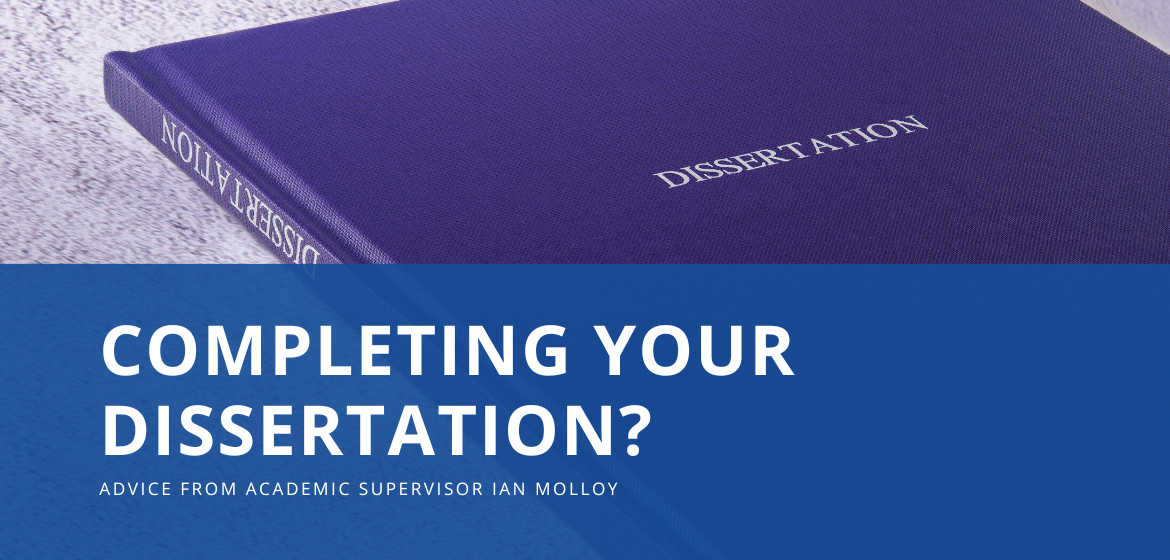
Completing your Dissertation? Advice from Academic Supervisor Ian Molloy
For many students, they will be at the start of undertaking one of the biggest pieces of research they will ever have to do, their dissertation. Here Ian Molloy, academic supervisor and lecturer here at ICHAS gives some great advice to help make completing your dissertation that bit easier.
Key Steps at the Start
I asked students, what’s the goal? What’s their goal and doing this dissertation? You get various answers to that. You’re going to get people with a real passion, say with teachers, I want to change the education system, and I want the Minister for Education and take note of my dissertation.
In this case, I say, so your dissertation is about your passion, and about you wanting to make a point and that is going to inform every bit of research you do and will probably bring bias and a lack of bracketing into it. Other people don’t know why they’re doing it, because they must, and they’ve never thought about it
Others then will say, I want to get a good grade, because I’m aiming for fourth class honours, and this is a heavily weighted module and others will say, I want to learn about research. So the first thing I coach them is to understand what’s their motivation during their dissertation and I hope that I can lead most of them to say, it’s to produce a really good piece of academic work that is bound to get the highest points possible.
Then they can look at it from that point of view that in the future they can if they want to, make a point to the Department of Education or the Department of Health or something like that. But for now, as a student, my goal is to present the best piece of academic research I can, based on getting the best results I can from it.
Pay Attention to your Title
Then I would coach them through their title, and the wording of their title. For example:
‘An investigation into depression, and CBT Area A, B, C, etc’
In that, I’d say, right, you basically have three dissertations in that title.
Once you have this kind of wording, I think you’re on dangerous ground as a student, because, you have depression in the title, and something else. You have to get into a lot of information on depression and you have to get into a lot of information on whatever comes after that. I work hard with them to get their title, very succinct, very clear & very unambiguous.
This would lead to something like:
‘The effectiveness of CBT for the treatment of depression.
If it makes real sense, and we can haggle it through that’s great. But a lot of people have very wordy titles.
The next point when we got that, right, is, your title will be the start of a golden thread that runs through your dissertation. I tell them to print off your title and stick it on the wall behind their computer screen and every bit of research you do, everything you do from this moment forward, you look at that title, and you say: Does this directly 100% relate to that title?
If there’s any doubt about it, you’re wasting your time and you’re wasting my time because I told you not to do it. I urge them to use the title we’ve worked on as the benchmark against every second they spend every word they type every question they ask, is it directly related to my title?
If I picked any part of it, just randomly finger down or run my cursor down and highlighted any section of your thesis, I should be able to see how that directly relates back to the title.
This will help you as you go through your lit review your thematic analysis, or whatever it is you’re doing. Your title is what informs every minute you spend on your dissertation.
Avoid ‘I’ where possible
Never use the first person. Anytime I see you, in your writing, it annoys me, when I’m annoyed, I begin to look at other things that might annoy me. It creates a negative thread because this is not about you. If you’re for example driven to prove a point to the world about how bad the mental health supports are for leaving our children. That’s your opinion, you’re passionate about it, and they can see this coming out here.
The other thing I would talk to them about is their opinion. As somebody looking at marking a piece of academic work, I don’t care about your opinions and your opinion shouldn’t be here. So, anything that looks like your opinion on something that is not backed up by your citation, you need to remove it from your dissertation. What I want to read is something like the research strongly indicates that, it’s not seeming, it’s not it would look like it’s not my thoughts on this are, what it is the research strongly indicates you’re kind of summarising, for me that this research strongly indicates that, etc. This is supported in the literature review in paragraph 3 and a goal.
Big statements of fact, big statements of generalisations, anything like that, I need to see that this is not you saying this. This is the research. It’s the literature, it’s the findings are strongly indicating this or is pointing in a direction.
Don’t Start to Worry about Academic Writing
From a writing perspective, a lot of people are scared about academic relating. What I try to get across to them is that academic writing is a game, and I do use this term again, that academics have decided this is the way the academic system works.
It doesn’t have to be complex; it has to follow the system. I try to take the fear away that this isn’t about writing with any fancy words or big words or sounding like a dictionary or thesaurus. This is about presenting findings that are strongly backed up by research, properly cited and properly referenced, and then the correct conclusions drawn out of this.
So let the research bring the academic writing, you don’t have to write academically you have to follow a system of academic writing. People think I have to be a novelist. I have to be good at literature. I’m trying to help them see you don’t have to be a to have to do is follow a system.
That system starts with an introduction that tells us what you’re going to do. It moves into a literature review that is directly related to your topic. It moves through to your methodology, how you’re going to go about doing this, it moves through to your empirical findings, and then you compare and contrast, and then you do your analysis and your recommendations.
I coach them to follow the system following this academic system. If I’m having trouble understanding what you’re saying, again, I’m back in a bad mood, I begin to turn negative, and I begin to watch for what’s wrong rather than what’s right.
I do go through biases with them, I explain to them if we see people with opinions, big statements, not referenced, flowery language that I can’t understand what you’re saying, that will bring in a bias and that will bring in emotion and it’s just, it’s not good. So keep it concise keep the language simple, use the research, and use the citations.
Keep Paragraphs Short & Sharp
I would tell them to try and keep paragraphs short. Each paragraph should be a point marked, explain something from the literature or your findings, then move on. A lot can tend to have huge paragraphs with multiple points. Don’t force your reader to understand. You make a point on something and now I’m beginning to think of something else, you just go on to the next paragraph. You can always delete it and add it back to the paragraph if you want to but keep the paragraphs short.
Don’t have too many points in a single paragraph and if you want to have a lot of points, use bullet points or numbering. Break it out and make it easy to follow. Let the person see, okay, there are five points you’re making here, and use bullet points or numbering to breakout points. Rather than have a whole load of points written in a paragraph. It clarifies everything and it gives a nice structure to the writing, even visually, it looks good. When we’ve got these numbering and I can see five or six or ten points.
I would suggest that they use lots of headings and break the work down into headings where possible, so it clarifies your own thinking. It allows you to follow your own work as well as for the reader to follow your work.
At least as an absolute minimum every chapter has an introduction, a main body of some description, and a conclusion. They are headings, they are separate headings. I try and get students to set a structure in place. It’s like building a cabinet or a wardrobe, you can then start slotting things into those various sections, and it begins when you look through it.
Map Out Your Dissertation
What I will do is send them a document before we start and that document has, October, November, December, March, April, etc. I give them a timeline and tell them roughly what we should be talking about in each of those timelines. In effect, you have a timetable. Just keep to this timetable and you’ll be okay.
I would also tell them, roughly the weightings against each section. So that must be reflected in the work you do.
Taking methodology as an example writing about it is basically a literature review of methodology. You’ve told me why you’ve chosen the methodology you’ve chosen. You’ve also described to me the six methods of qualitative research, and why you’ve chosen the one you’ve chosen.
I’m sitting there going, “yep all these boxes are ticked, well done I’m happy, this is great stuff£”. I go through that with them, and it takes the fear out for them. They all still seem very confused about methodology.

Doing Interviews? Get them done Early
Also, when it comes to research and you’ve decided you’re going to do interviews, the minute you’ve got ethical approval, you’re out doing interviews or doing your surveys, literally, the next day, get them out there, just have this ready to go.
Have your questions written, or have your recording device ready, have your consent forms ready, know who you’re going to ask for permission to go and contact your participants, and be ready to pull the trigger. The reason I’m saying that is because if you’re doing a qualitative piece of work, you’re probably going to do interviews, they’re probably going to last half an hour to 50 minutes, they all have to be transcribed, and then you have to do a thematic analysis of them. That’s a chunky bit of work. Just get your recordings, just get your interviews done.
Now you have the brevity of a bit of time, now you can transcribe and begin to do your analysis. Even if you don’t do anything with it, get those five or six interviews done.
I would advise them whether they include in their thesis to do a pilot interview. I would generally say to them if you have it, whether you’re unstructured, semi, or structured, try it out. Test the recording device to see how it sounds when it’s played back, find someone, and do a pilot interview with them to see how it works, especially if you’re nervous about doing this.
Just go to a colleague and just find out that if you’re reaching your pilot interview data saturation very quickly, you have a problem. Or you’re not getting enough data? Or if they find the questions difficult. Better to find that out in an informal pilot interview. So that gives you that sense of because it doesn’t matter. It’s given me the ability to tease it out, and see what you need to do to draw the client out.
When talking about this, I introduce the concept of bracketing to them. You need to show that you’re bracketed, especially if you’re a teacher interviewing a teacher, or a therapist interviewing therapists. You need to have this concept of bracketing where you’re objective from the data, you’re not leading. There are another few paragraphs you can bring into your methodology. So, you can bring that in.
Finally, I do tell them for every citation, write your reference. You’re going to have a heap of 200 papers and books around you and you’re going to be desperately searching through for the one you chose, and I said, just write it in. Don’t leave it to the end, write down the references as you progress through your dissertation.
About Ian Molly
Ian has lectured at ICHAS in different areas, including Cultural Issues, Theoretical Perspectives in Counselling and Psychotherapy, Advanced Counselling Skills and Personal Development. Ian also does private therapy, work most of his work deals with anxiety-related issues.























